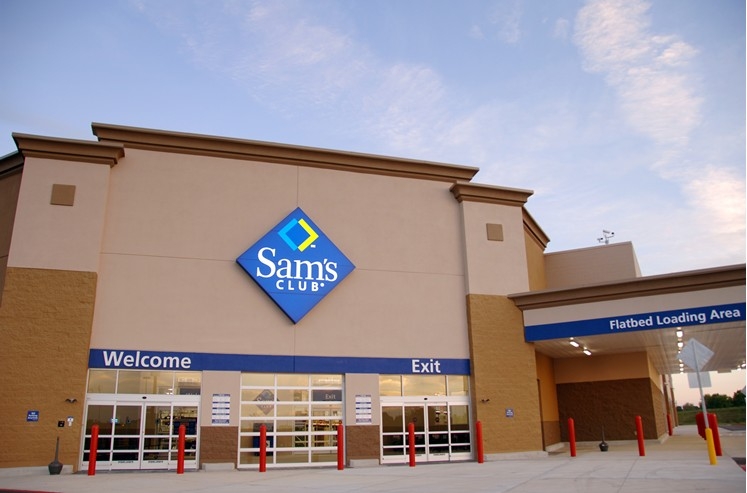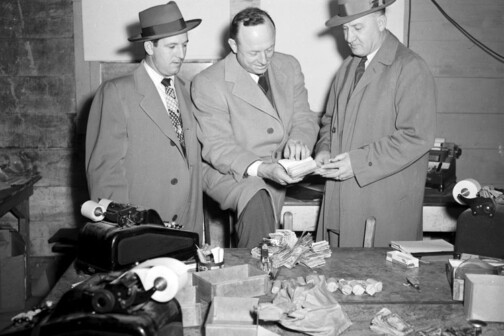
This Sunday, the Trammell Crow Company, on behalf of its clients Sam’s Club and the Metropolitan Life Corporation, the primary investor in the project, will blow up the old Xerox building just off Central Expressway in order to make way for a big box store right in the heart of the fastest growing, highest tax base, densest area of Dallas.
It is utter madness.
And while I know you have heard the story in some form or fashion, on the eve of destruction, I believe it is worth recounting. There are many lessons in the sorry tale of Uptown Sam’s, and the story should enrage you — not provoking the kind of idle anger where you throw up your hands and go, “Ah, there’s Dallas, yet again,” but rather provoking the kind of rage that makes you want to run down to city hall with pitchforks in your hands. Let’s get to it.
To bring you up to speed. The Trammell Crow Company acquired land just north of the Haskell-Central Expressway interchange on behalf of MetLife, the institutional investor whose money is funding the deal. They submitted for rezoning, rolling out pictures of a West Village-style development, only to sneak some language deep in the proposal that allowed them to, if they so desired, plop a big box down on the spot. Council person Pauline Medrano, on her way out of office, let the zoning slide through, and Trammell Crow tossed their pretty pictures in the trash and began working with Sam’s Club.
They knew they had a winner with Sam’s Club. After all, the same company struck the same kind of deal with the mega-retailer back in the mid-2000s, when they bullied residents out of apartments off Skillman, promised the city that their demolition of the apartments would not disturb a rare urban forest along a creek that was a habitat for an extraordinary number of wild species, and then bulldozed the whole thing, turning the forest into a concrete mess. That Sam’s Club development made a bundle for the brokers on the deal, and was a finalist for “deal of the year” in 2011. Business seems to be trucking along finely for the retailer. Go business.
So, why not try it again? After all, there’s precedent for a big box at Haskell and Central Expressway. The Target that is already located there is one of the most successful locations in the state. A Sam’s Club will do extraordinarily well there, and the brokers will score another huge commission. To get it done, they just had to hoodwink the city and the citizens of Dallas once again, and they pulled it all off rather shrewdly. Again, go business.
Then, last year, residents living near the site realized they were hoodwinked. They didn’t want to live next to a parking lot and a big box. That’s not why they bought their homes where they did. They invested in the area because way back in the 1990s, when Dallas decided to spend all that money burying Central Expressway, the whole point was that a below-grade highway would allow for Uptown density to jump the road and continue to infill the rest of the city. That would help grow the tax base, promote incremental spread of development, and incentivize more developments, mimicking what is happening just a few hundred yards away. On the other side of the road, everyone wants to build more and more and be closer to everyone else and make money by benefiting from everything that a livable, walkable, profitable urban district provides. It was a really good plan. Go business.
So, when the residents found out they had been hoodwinked by Trammell Crow (on behalf of MetLife) they were pretty ticked off. A handful of volunteer neighbors launched a noble fight. They stirred up enough of a dust storm to delay the City Plan Commission’s approval of the Sam’s Club project plan. However, the CPC ultimately only had authority to make sure the proposal fit the zoning—and it did, of course, because the zoning had been slid through. The neighbors, now organized under the East Village Association, sued and tried to get a temporary injunction to stop the construction, arguing that, essentially, they were hoodwinked during the zoning process.
That put the city in a funny spot. On the one hand, their residents wanted the city to support the kind of development that would benefit Dallas, that would follow the dictates of all of the plans the city has spent millions of dollars and thousands of man hours developing over decades, that would best grow the city’s tax base, that would make Dallas more attractive, and that would respect the desire of the people who live there. But the city had already approved the zoning.
Now, were they fooled? Were they lazy? Did they not care? Did city staff know all along about the big box provision in the zoning — that through the entire planning process they knew that Trammell Crow Company was working the deal with Sam’s Club — and did they just brush it under the table because we have a system of government in Dallas in which city staff owe their job security more to making sure they don’t piss off business interests — that they know the face of MasterPlan’s Dallas Cothrum, the consultant who represented Crow, better than a dozen city council members who have come and gone in the last decade? Did they know about Sam’s but also realize that their jobs owe more to keeping people like Cothrum and executives at Trammell Crow happy rather than to being helpful, responsive, supportive, and transparent to elected representatives?
The answer is probably all of the above. But none of that really mattered by the time the East Village Association filed for a temporary injunction against the development. If the city fought Trammell Crow, Sam’s Club, and MetLife, they knew they would have a huge lawsuit on their hands. So the city’s lawyers went to work, not for the citizens of Dallas, but for the three large corporations who were screwing them.
A judge ruled against the East Village Association, after first admonishing the developers, but saying that, ultimately, the “city had done enough to force her to deny the residents’ request,” as the DMN reported at the time. The East Village Association hoped to take the case to trial, but then city lawyers started playing lawyer games with its residents (the people whose tax dollars end up in their paychecks). In a flurry of legal filings, the city argued that the East Village Association had no standing to bring the case forward. A judge ruled in favor of the residents, but then the city appealed. That’s where the legal end of this sits, with a case sitting in the Fifth Court of Appeals. There it will likely sit, waiting as Trammell Crow goes ahead with clearing the land and constructing the store for Sam’s Club. The store will likely be open and operating before any legal decision is final.
This week I spent some time speaking with Jonas Park, the tireless leader of the residents’ fight against Sam’s Club. He has one more hope, he says. There are a collection of 100-year-old oak trees on the lot that will be bulldozed to make way for the big box. The city still hasn’t issued a permit to take those trees down. Under the city’s current tree ordinance, the trees can be removed if the developer promises to pay into an arbor fund or replant enough new trees so that their combined trunk width is equal to the caliber of tree removed (yes, according to city code, a dozen saplings is equal to a 100-year-old oak). Park hopes that the permitting process for removing the trees offers another chance to stymie the development. He did mention the idea of chaining himself to a tree. Power to him, I say. But I covered the Timbercreek Sam’s Club development back in the day, and remember the impassioned environmentalists that mobilized in an effort to save the hawk habitats. Park has proven he has fight, but I feel like I’ve seen this movie before.
So where does that leave us? Well, it means that in all likelihood there’s going to be a Sam’s Club in Uptown. And, in all likelihood, you are going to shop there. Millions of people will shop there. After all, when Trammell Crow says “target users” want a Sam’s Club, they are right. The Sam’s Club will be successful by Sam’s Club standards; it will make money, create sales tax revenue, line the pockets of the brokers at Trammell Crow, and ensure a steady maturation of the funds invested in the land by MetLife. It could even end up, like the Target, one of the most lucrative Sam’s Clubs in Texas. Go business.
But that kind of business success is not the point of the story. The point of the story is that who really loses at the end of the day is business. And, by extension, it’s the city who loses. And, yes, the residents are losers, and those of us who dream of denser, more attractive, more livable Dallas are losers. But real, huge loss lies in the opportunity cost of putting a big box in the center of our urban core.
Why?
Because if the city had done its job and followed the dictates of all of its plans, it would have enforced zoning that ensured that whatever development happened on that land promoted the highest and best use of the land. Promoting the highest and best use of the land would ensure that the property values grow, that the tax base grows, that the city would become both richer and more efficient, and that the amount of economic activity in the area — jobs, sales tax revenue, property tax value, secondary businesses, social exchanges, civic identity, branding, reputation, and all the other quantifiable and unquantifiable virtues of urban places — would have been greater than they will be with this big box. Instead, by kowtowing to the particular interests of these particular developers, the city has lost a tremendous amount of money. That means we, the citizens of Dallas, have lost at tremendous amount in this deal.
The deal makes sense for Trammell Crow and MetLife. It is cheap and it is easy. The economics at the location would support dense development, but if a developer is not required to build densely, the economics also support a big box. And the profit margin of plopping down a big box is substantially higher. Plus, it’s easier. You can underwrite and finance a big box development on a cocktail napkin at happy hour with your buddy from MetLife in between chatter about boozy memories of two boxers clobbering each other at last year’s Fight Night. Penciling out and finding financing for mixed-use is complicated, it takes time, it takes effort and work.
On a certain level, I don’t blame the developers in this case. I find how they handled the entire deal profoundly unethical, duplicitous, and fundamentally damaging to the city they work and live in. But I’m not surprised. I used to work in real estate; I know how these people think. The logic of the Sam’s Club development is entirely typical. But that’s why we have government. That’s why we have zoning. That’s why we have a public process. And the story of Uptown Sam’s shows that, on a fundamental level, none of these things really work in Dallas. They don’t work because city staff is entirely unaccountable. They don’t work because our politicians are often lazy, incompetent, or compromised.
And when government doesn’t work, you know it’s time to get out the pitchforks.




